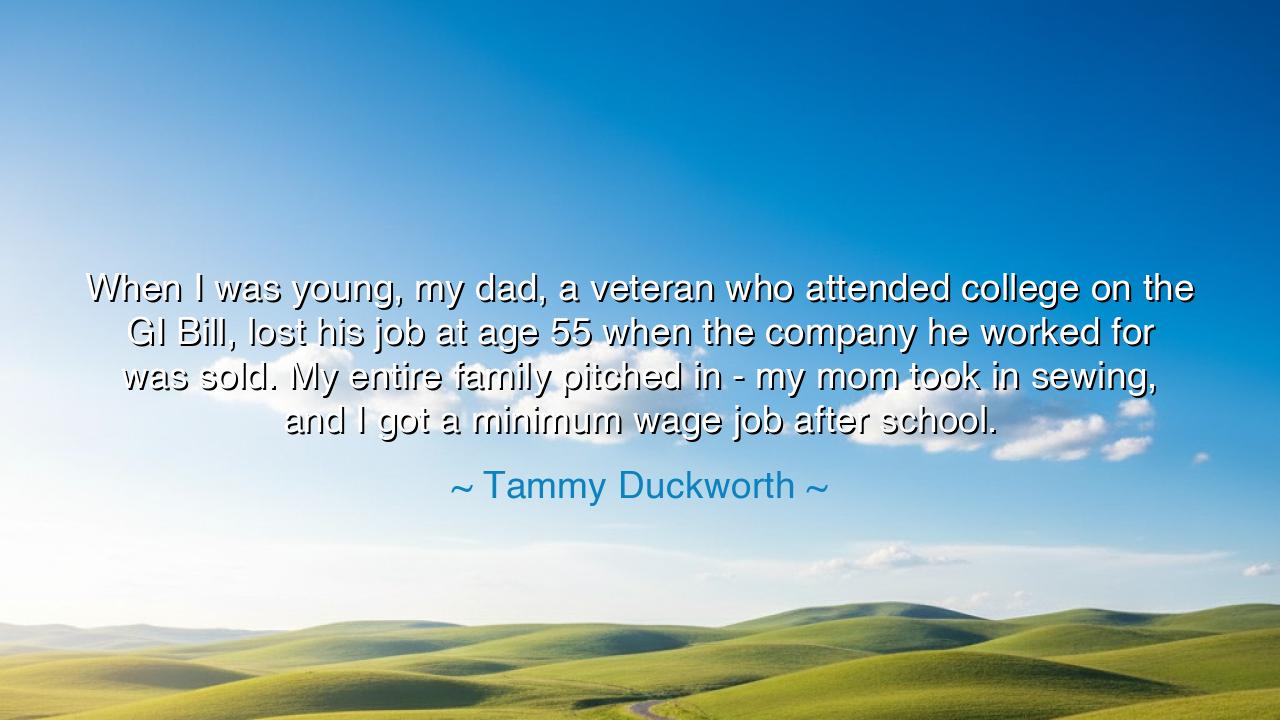
When I was young, my dad, a veteran who attended college on the
When I was young, my dad, a veteran who attended college on the GI Bill, lost his job at age 55 when the company he worked for was sold. My entire family pitched in - my mom took in sewing, and I got a minimum wage job after school.






In the steadfast words of Tammy Duckworth, soldier, survivor, and servant of her people, there echoes not only a story of hardship, but a testament to the enduring spirit of family and resilience: “When I was young, my dad, a veteran who attended college on the GI Bill, lost his job at age 55 when the company he worked for was sold. My entire family pitched in — my mom took in sewing, and I got a minimum wage job after school.” These are not the words of complaint, but of quiet triumph. They remind us that even in the shadow of loss, the light of unity can sustain a household, and that the measure of a family is not its comfort in prosperity, but its courage in adversity.
This quote springs from the soil of experience — from the heart of a woman who would one day lose her legs in war, yet never lose her will to stand for others. Duckworth’s story is one of those rare truths that sound ancient though born in our time, for it speaks to a virtue older than kingdoms: endurance through shared burden. When her father, a man who had served his country and sought dignity through labor, was cast aside by fate, the family did not fracture. They did what families have done since the dawn of civilization — they gathered close, bore the weight together, and turned hardship into strength.
To understand the depth of this moment, imagine the home in those days: the clatter of her mother’s sewing machine filling the night, the hum of its needle stitching both fabric and faith; the young Tammy, weary from school, counting coins earned from work not out of bitterness but duty. These are the unseen hours that forge character. No anthem is sung for such labor, no banner waves for such toil — yet from these quiet struggles rise the heroes of nations. For it is in the small, steadfast acts of survival that the great virtues are born: humility, gratitude, perseverance.
The ancients would have recognized in this tale the mark of the household as the first battleground of virtue. When Rome faltered, it was the Roman home — the domus — that preserved its strength. There, the mother’s work and the children’s obedience sustained the dignity of the family even when the empire’s banners fell. So too, in Duckworth’s home, the spirit of the veteran father, though defeated by circumstance, was upheld by the devotion of those he had raised. It was not wealth that defined them, but loyalty; not power, but shared sacrifice.
Let us recall, too, another story — that of Theodore Roosevelt, who, before rising to greatness, faced the death of his wife and mother on the same day. Broken and alone, he retreated to the Dakotas to labor among the harsh plains, rebuilding his strength through hardship. Like Duckworth’s family, Roosevelt learned that work, when joined with purpose, heals the wounded spirit. Labor, undertaken not for glory but for one another, becomes a sacred act — a defiance of despair.
Tammy Duckworth’s reflection, then, is not simply about economics or family duty; it is about the dignity of resilience. In a society that often worships ease, her story is a reminder that adversity is not the end, but the beginning of wisdom. When one’s foundation is shaken, the response must not be despair but action. Her mother’s sewing, her own after-school job — these were not symbols of defeat, but of defiance, of the refusal to yield to helplessness. Through that struggle, the young girl learned that service and sacrifice were not burdens but privileges — lessons that would later guide her on the battlefield and in the halls of power.
And what, then, is the lesson for those who listen? It is this: in times of loss, do not scatter — gather. When the winds of fortune turn against you, do not curse them — stand together and push forward. Families, communities, even nations, are tested not in their ease but in their endurance. Let no one in your household suffer alone; let each hand, however small, take hold of the burden. Work not only for bread, but for one another’s dignity. The needle that mends a torn shirt may also mend a broken spirit, and the smallest act of contribution may sustain the mightiest heart.
So remember the wisdom in Duckworth’s words — that greatness is born in kitchens and workshops, not only in parliaments and palaces. When you face the hour of trial, take courage from her example: endure, serve, and believe that no hardship is wasted when it is met with love. For in the household where every member gives, even poverty becomes holy, and from such homes rise the men and women who rebuild the world.






AAdministratorAdministrator
Welcome, honored guests. Please leave a comment, we will respond soon